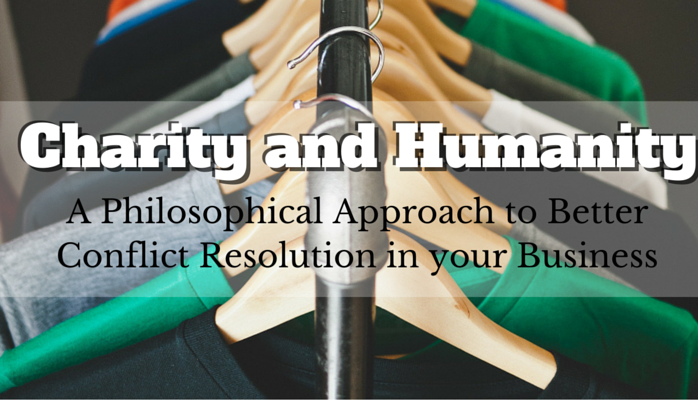
The heart of all business is communication.
As central as the way we talk to each other can be to every stage of business, from marketing to production, you’d think that communication and conflict resolution would get more attention in our industry forums. As much as we need technical information about the way we work, the way we promote, discuss, and argue doesn’t seem to merit as much concern.
Watching communications break down between salespeople and customers as well as among my coworkers spurred me to write about the subject several years ago, under the heading ‘Considering Charity’. In that piece I suggested that everyone apply a philosophical principle, namely the Principle of Charity to their arguments; for those of you who may not have had a beginning philosophy class, The Principle of Charity is a philosophical principle that suggests that in evaluating a speaker’s statements, one should take the strongest, most rational interpretation of the speaker’s position.
This simple principle has made me a better listeners from the first time I applied it.
Imagine for a moment a typical disagreement with a customer or coworker. Rather than engage with defensive, emotional reactions like ‘This person is either stupid or crazy’, imagine that we took their statements at face value, not reading between the lines. Imagine that rather than looking for a way to invalidate them, we looked for the rationale that made them sound the most reasonable and grounded. That little exercise can effectively disarm the cycle of blame-shifting that can happen when things go wrong. By requiring the listener to look for that rational explanation, it subtly introduces a perspective shift. While looking for the best interpretation of the speaker’s statements, it is natural that the listener would try to imagine the speaker’s position.
The second principle, the Principle of Humanity, is the perfect complement to complete this shift of perspective. It encourages the listener to assume that the speaker’s statements are grounded in their beliefs and their understanding of reality, and that if in a similar situation, the listener might feel and think similarly.
This principle extends that perspective shift into something that approaches sympathy, if not empathy. Imagine a disgruntled customer is questioning your practices; if instead of coming to the defense of your methods or attacking the customer’s argument, you took a moment to presume that if you were in their position, you might be similarly upset. Pair that with an attempt to see their statements as rationally as possible, and you will find yourself more willing to discuss the situation and to find the situation that brought their statements about. Though your immediate reaction may be to find the blame, when you decide to see the customer as a rational person who is trying to give you a sensible account of what has happened from their perspective, you are less likely to miss the truth embedded in their statements; you will look for a reasonable explanation for their upset and attempt to examine the specifics of the situation that caused their upset and how it came about.
This may sound a bit emotional, but it boils down to a solid business practice; that search for understanding becomes a chance for you to inspect and evaluate the customer experience your company provides and the space you make for calm and reasoned consideration means that when you ultimately evaluate what went wrong, even if you are aiming to arrive at a sense of who or what is responsible for the problem, that you’ll do so from a logical place that takes both your position and the customer’s experience into account.
Turning your reply from what might have been a counterattack into a clarifying question or an attempt to reframe the situation so that both parties understand the situation is a critical step, and these principles make that shift feel automatic and natural.
I chose to revisit these important principles because I feel that they’ve become even more important; with the widespread acceptance of social media and the return to relationship-driven marketing a foregone conclusion, our ability to listen and arrive at an understanding with people has become even more critical. When exchanges play out publicly, the irrational and defensive stances that we can take when it feels like our reputations are on the line can be incredibly damaging. Even when faced with what you may ultimately decide is an irrational argument, starting from a place that examines and assumes reason underpinning the argument is the best way to dismantle the initial burst of retaliatory energy.
This is our new sales climate: customers now measure service by our level of care, and by that I mean sincere concern, for their situations. Experts see the new marketing as a series of attempts to give our customer personal attention and value before even insinuating that they reciprocate. Empathy and depth of personal understanding are becoming commonplace concerns in any business strategy. In light of this environment, these principles are critical, as they prime us to act and react in ways that strengthen our bonds with customers and enhance their sense that they are heard, understood, and their feelings are considered. If you sincerely devote yourself to practicing these principles, it won’t be a simple marketing ploy; as someone who assumes reason and looks for the conditions shaping the positions in an argument, you will be more engaged by default than someone who reacts to any friction by immediately justifying past actions. The first person opens doors and encourages discussion while the second closes them and bars any chance for understanding.
I’m not asserting that we’ll solve all conflicts and communication problems by simply pausing to consider the point of view of the other party. We will encounter someone acting purely on emotion at some point. When we do, we’ll come to the realization that there’s no further inroads to understanding with someone for whom that isn’t the point of conversation. That said, my experience has been that the number of rational people in ‘bad’ situations far outstrips the number of truly irrational people who want to maliciously cause problems. Besides, the ultimate measure of the usefulness of these principles should center on whether they help you be who you want to be in business. If you feel you should comport yourself in a way that exudes fairness and a calm confidence, these principles can help.
In my mind, even if the eventual result is that I’ve fallen victim to listening a little too long to one of these rarely encountered malicious individuals, I can comfort myself with the knowledge that I approached the situation in a way that matches my ideals. I am happy knowing that I tried to arrive at an understanding, with the substantial added benefit that the rational people with whom I applied the principles, and to whom I might have stayed closed-minded if I stayed in a defensive position, have had a fair hearing and likely have a better feeling about me and my business as a result.
tags: business, charity, communication, conflict resolution, consulting, customer relations, customers, disagreements, discussion, empathy, erich campbell, management, relationship marketing, relationships, sales, social media, sympathy, tactics, talking, techniques, the principle of charity, the principle of humanity, validation
This site uses Akismet to reduce spam. Learn how your comment data is processed.








LEAVE A COMMENT